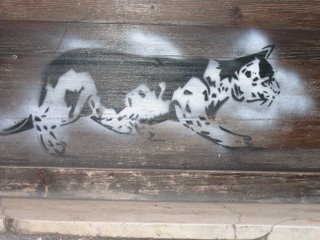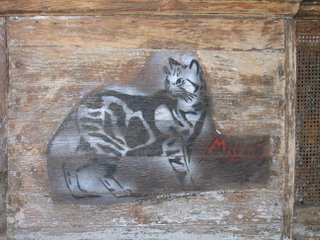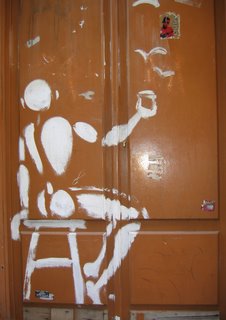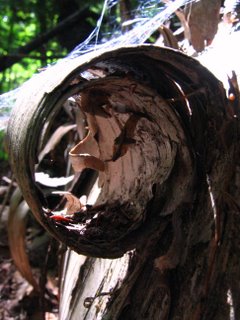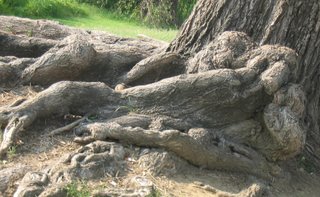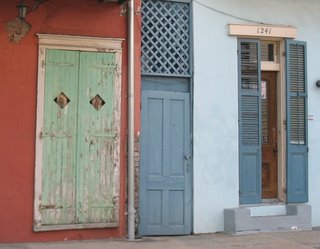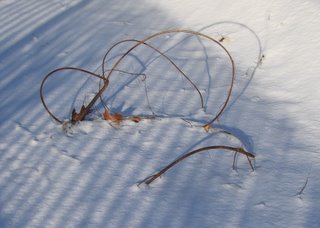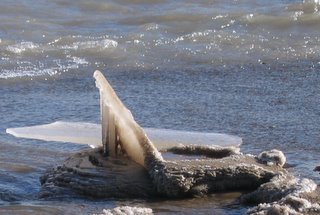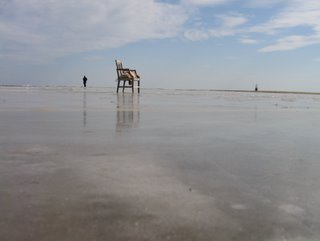serait-il possible que, après la saison de la mort, vienne la saison du vivant?
Monday, December 04, 2006
Sunday, December 03, 2006
... saved from the censorship of a museum custodian at Maison européenne de la photographie, a shot through the negative of one of the three photos by André Kertész, exhibited, like the same model in different poses, in different contexts ...
*
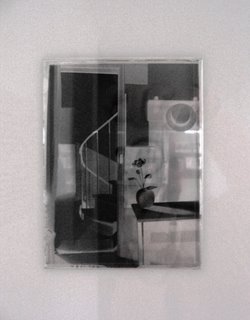
*
i said, i will give you voice. i will give my voice to you, and i will have none. speech, let now speech flow from your lips, speech your tongue shudders, tingles with sounds not your own, sweet bitter fruit, peel it, speech under its skin. i will utter, my voice in your throat, speech pulp between your teeth, swallow, my voice in your throat. i said, and i had none.
Saturday, December 02, 2006
écrire à partir de rien. du rien qui m'habite. (le rien, c'est un vide d'émotion. soit que l'émotion habite à mon côté comme un petit animal mal-nourri. et cela dure. cela peut durer des mois. l'animal, c'est la peau et les os. surtout les os. je n'ose pas le toucher. il se meut encore, cet animal, mais je suis sûre qu'il ne me reconnaît plus.) écrire à partir du rien. pourquoi "à partir"? faut-il partir? un départ, est-il nécessaire? (on va saigner l'encre. l'animal le sait. une plume d'un oiseau inouï plonge dans les vaines de l'animal qui signe ainsi. écrire de la part de l'animal. et il faut encore, à côté, cet oiseau rapace.) on n'écrit pas pour se souvenir. on n'écrit pas souvent. presque jamais. on écrit afin d'oublier. l'oubli, l'oubli, un tendre lullaby, la houle, l'oublie, ça berce comme les vagues, comme le brouillard, ça s'oublie. ból, l'oubli. la douleur en polonais est comme une boule de neige. boule oubli, lullaby la houle. (l'animal mélange les langues. l'animal-émotion délaissé. il se nie dans cette boule de neige. il s'annihile. il se meut en rien. il a mal et rien. il s'écrie.) cette voix n'est pas humaine. mais elle n'est pas rien. elle ne se laisse pas prendre en piège ni en brouillon. elle ne se laisse pas prendre. ni au pied de la lettre, ni au bout de la langue, ni même par l'oreille. étrange animal. ce rien s'écrit. (il faudra déchirer les pages. leur blancheur de neige. les cris du papier blanc. couché sur la neige, l'animal se meurt, se meut. l'émotion, il se meut hors de soi, à côté de moi, presque oublié, mais, s'il aimait, aime-t-il toujours, l'animal, le même.) écrire rien. ce rien et pas un autre. celui-ci, précisément. lançant des boules de neige, ciblant la feuille vierge, écrire, blanc sur blanc. soit noir sur noir, perçant des trous noirs dans le ciel. si blanc soit-il, l'animal, il se meut. il ne parle plus. l'écrire. il faut l'écrire, cet animal. c'est sa dernière chance. (à partir de rien. à partir de ce blanc où il saigne. ce blanc qui se remplit de n'importe quoi, de la neige, du sang, de rien, du noir. à partir. écrire à part. solitaire. comme l'animal, chaque lettre. solitaire. chaque être qui s'écrie dans le blanc de la page.) impossible de le comprendre. l'animal ne parle pas. mais l'animal a une langue. des oreilles. une voix. il renifle le sang et l'encre. les aime, l'animal, et le sang et l'encre. il aime l'étoile. ce rien qui m'habite. trou blanc au sein d'une page noire. le poil de l'animal est lisse comme la page d'un livre. (cet animal, tu va le lire. tu va lui lire. tant qu'il y a la voix, l'animal se meut. il se meurt mais vit. les deux en même temps. il s'émeut. il aime les histoires. raconte-lui l'histoire de ce rien qui m'habite). écris. à partir de rien.
Monday, November 20, 2006
Saturday, November 18, 2006
Monday, November 13, 2006
affectionné
le jour
où, à côté de moi, s'est tue la parole
puis-je l'être différemment
haut dans les rues
puis-je l'être différemment
haut dans les rues
hurlant
mon taire, éclaté, au bout
de la langue
soit
étale solitude
tout près, à côté de moi,
ici, blessure aride,
pourtant habitable comme une larme
à mon insu
coulant, ou suspendue
à côté de moi, tout près, mise à côté de moi
comme courir
hurlant
dans les rues
inouïe
parler comme s'est tue, tout près, à côté de moi, la parole,
si
je, ou autre, écoute, à côté de moi, qui s'est tue
on n'entre pas
de la langue
soit
étale solitude
tout près, à côté de moi,
ici, blessure aride,
pourtant habitable comme une larme
à mon insu
coulant, ou suspendue
à côté de moi, tout près, mise à côté de moi
comme courir
hurlant
dans les rues
inouïe
parler comme s'est tue, tout près, à côté de moi, la parole,
si
je, ou autre, écoute, à côté de moi, qui s'est tue
on n'entre pas
dans
la solitude
main fermée, langue altérée
main fermée, langue altérée
Tuesday, November 07, 2006
Friday, September 08, 2006
Monday, August 21, 2006
several consecutive viewings of Herzog's The Grizzly Man.
(Herzog is one of my favorite directors: der Bruno in Stroszek and Kaspar Hauser, the world of deaf-blind in Silence and Darkness... His love for rich worlds existing on the banks of the "mainstream"...)
in the Grizzly Man, most moving is the dialogue of two film-makers. Only one accustomed to observing the world through a lense may understand that cinematic unconscious with its empty frames coming to life in the wind; with its double, triple, multiple takes that, like some rough drafts, intended for cutting, remain on the tape; with the secret presence of another person holding the camera in her hand, presence betrayed only by a slight shift in frame, following its object...
the Grizzly Man is a palimpsest. Herzog's voice-off commentary (and a cameo appearance), his witness interviews, superposed on Timothy Treadwell's footage. Herzog's calm, wise voice palliates the shock of the original document: exorbitant hundreds of hours of film, culminating with a blank screen where only the sound records the film-maker's final moments, the horrible death that, like all horror, is consigned to the unimaginable. Herzog is unable to withstand the temptation of romanticizing his subject: the Alaskan landscape becomes the image of the hero's tormented soul... Fascinated by characters existing on the social margins, by exiles, Herzog is firmly planted on this side of that invisible boundary and, more than marking the protagonist's transgression, Herzog's commentary underscores his own fear before this impossible crossing.
and yet, despite the director's attachment, critical as it may be, to our civilization, his film is a chance to step outside it and to look at it from without. Perhaps that is another horror: like standing on the other side of the mirror only to find the contents of one's room unrecognizable. Hidden in the brush, like a wild animal stalking his prey or observing the movements of the enemy, Timothy Treadwell, and we with him, on the side of the camera lens, watch a group of men pull to the shore. To Treadwell, they are hunters, poachers. Firmly convinced of the threat, he can ignore their own photo equipment. He views them as if he were seeing humans for the first time.
humanity has turned into a wilderness that threatens on all sides, and the slightest human gesture, a common cliché of friendliness--a smiley doodled on a pebble--has become a menace.
would it be more interesting?, productive?, if Herzog reflected on this explicitly? To think that all of Herzog's protagonists, all people living on the margins, present a multiplicity of possible worlds? To think that their form of exile is a specific mal du siècle. Condemned to unexplicable alcoholism within the society, a Timothy Treadwell finds cure in a society of his own making.
there are scenes in this palimpsest that i would not have missed: the spreading of Treadwell's ashes over the Alaskan meadow... On the other hand, I enjoy Herzog's lingering camera: long after a hurried film-maker would yell "Cut!," Herzog lets the film roll, catching a gesture of someone who has just finished speaking and who perhaps waits only for the "Cut!" to walk off screen. The coroner's arm drops; Treadwell's "widow" examines the watch taken off his severed wrist. His cinematic technique is most naked here. Pure form.
where the palimpsest is most successful is in the superposition of visions. Treadwell sees a romanticized nature--parallel to Herzog's own idealization of his subject; while Herzog's clear mind sees indifference and hunger.
perhaps it is precisely that divergence of glances that makes the spectator conscious of his own palimpsestic viewing?
mental montage: what is it that one remembers of a film?
Monday, August 07, 2006
On Procrastination
The thing deferred is sometimes the very thing we are eager to do immediately: write a letter to a friend; or a poem: the dragonfly stopped here like a comma; craft a collage... We put it off out of a sense of duty to get done what is necessary: may it even be the work we have picked so joyfully. And both are left untouched. The postponement of the first thing works like magical thinking: since it is the first thing, not doing it will only defer the initial moment of doing the other. It seems to carry with it the promise of the past, of the time when there was time for everything, as incredible as childhood, that will awake again as soon as the first thing is done.
Sunday, June 25, 2006
In the history of foreign occupations, American occupation of Iraq distinguishes itself by outward demand for "free speech and expression." The belief in abolition of former repression often brings about the censorship of any voice to the contrary. The new "freedom" comes with a user's manual: the "freedom of speech" may be used only to oppose the old regime while letting the occupant preserve his illusory position of an outsider.
Wednesday, June 21, 2006
If the first sentence were only the birth of the next one, setting it down on paper would not be so difficult. The reason for my avoidance is rather that it shuts the door to a number of other sentences, a moment earlier still possible. Possible, yet not known to me, and so, equally impossible. And yet, that first sentence -- each sentence, since each is first -- is the death of a next one. The first sentence reduces me to silence: whether or not I write it.
Frost and dream are formed of the same matter. I freeze, zamarzam, and cold dissolves the diphtong, "r" and "z" chatter as teeth. Marzę, and the dream dissolves the glacial brume. Sleeping body lies frozen in the ice sheets. Marznę, I am cold, and refuse to awake. The dream holds me captive. It has its seasons.
Thursday, May 18, 2006
"do you have a minute for the environment?" asks a youth on a street corner.
i invent minute pills and distribute them to each inquirer. it's all fake, of course. i use aspirin tablets and with henna ink tattoo "1 minute" on each white button. i have pocketfulls of time. and because time is money, i try to trade it in the bank for green pills, but there definitely is some color discrimination going on, because bankers routinely deny my request.
Thursday, April 20, 2006
Where? Over there. There, other than here, and yet not far from here. Where inhales, there exhales. Overhear. Over there. Not too far. However near. Insecure. Breathe, grieve. Sigh. Reprieve. Rhyme, skip. Wherever. While not here. It goes. It works. There, appears, separate. Nouns here, there verbs. Heave. Over. Here, hover. Breathless, lung pumps, bleeds air, or leaks, over there, closer, separate. Where? There is no from there to here. Here and there. Or here. Candor. Overly. Heft. Here is as it is. Leave. Go there. Work. Their blood is heavier than her lung. While not here. Blind. Strong verbs command. Nouns move. Then and now. As if. Where here, there hither. Laugh. Lash. Nearer than there. Not entirely here. Laugh is there. Over there. Under work. Under. Lung sings, blood stains. Underheard. Her ear.
Sunday, April 16, 2006
in my dream, a priest wearing a plain mask of clay, colorless and without any features, barely with narrow slits for the eyes and a wider one for the mouth. behind the mask, deep darkness. the priest was giving a sermon to adolescents. i had followed him there (why in a church?). only i knew there was nothing under the mask. he gestured with his long fingers and, suddenly, addressing me, said: "those whom truth has repelled." the sentence sounded as a portent. something about went so much against the grain of everyone's expectations that no one even noticed what he said. the palm of his hand turned downward like a flailing leaf, the priest flicked his middle finger as if he wanted to drive me away with it.
Wednesday, April 12, 2006
i think one's life is in fact resistance to life. what i mean is resistance to its fragility, to its failure. in common terms, to poverty, to intertia as sheer existence, to this unwillingness to step out of what suffices or forgetting it in excess of things which efface that memory. everything self-destructs. i am not sure whether it is an instict of self-preservation or desire for suicide that forces one to transform deadly declensions into generative interrogations.
Saturday, April 08, 2006
intymność chmury na wysokości jedenastego piętra staje się w nieosiągalnej, złośliwej wręcz, chęci dotyku, poślizgu, niewyobrażalna. jak może być niewyobrażalnym coś co znajduje się tuż, co ociera się o drugą stronę muru, do szyby łasi się bezdźwięcznie, a w czego chwilowej szczelinie znajduję się właśnie? są słowa, takie jak to ostatnie, które czynią świat prostszym, słowa, które się zapominają i zapominają również, że tutaj wiatr jest dachem, a przez wyrwę w chmurze wydostaje się mglista noc. ciemność widnokręgu to usta, a ja głową haczę o szept. północny wiatr spłaszcza wszystko i możliwe jest, że i nas zmiażdży. wtedy i ty i garnek z herbatą spulchnimy podbrzusza efemeryd. i jeszcze usłyszę: dzisiaj. dzisiaj się tak już nie pisze.
Friday, April 07, 2006
Isabelle, the child story-teller, you must wonder what happened to her, after watching attentively Trolösa, Liv Ullmann's dream of Ingmar Bergman. Isabelle, who never really speaks, a child dancing on the margin of a motion picture, or weeping, or curled up in fear, not a thread that holds the story together; rather unravels it, undoes everyone's stories they tell of themselves.
There is in the midst of happiness an empty point, a speck of nothing, like the period of a sentence (you thought it was what came at the end, but the period is right there in the middle, even before the beginning, a bud of a phrase) into which it slowly folds, coveting the bitter taste of this nothingness that makes happiness, suddenly, incomplete.
A jealous story is haunted by the knowledge of its ghost. Jealousy holds on to empty points, to loose threads, and has this uncanny knack for turning the hero out of his own story, for kicking him out the door, and making him watch, with perverse satisfaction, another take the place he gave up for the sake of setting watch.
A dying vision of a stage director. You didn't believe in his existence, at first. It was only the asymetry of a window that made real the invention of his memory.
Actors playing actors: you doubted their fidelity to the script until you realized that it was up to you to write it.
Isabelle left the room in order to retell the story in a different color.
Thursday, April 06, 2006
sny do ciebie pisze, śnią mi się jak długie listy, jak listy sprawunków na podwieczorek w sobotę, albo listy składników do ciasta drożdżowego; głaszczę je, puchem pokryte liście, palczaste i zaokrąglone; ślę je z wiatrem, i na przełaj, śnią mi się polecone; nie przeczytasz ani ich nie złapiesz, chyba, że za ogon, który rozpłynie ci się w reku jak chmura; mglą się i lgną do ciebie, żarliwe sny podlistne, nie zakorzenione myśli krzaczaste, kłębią się wzdłuż rowów twego porannego czoła, i nic im nie stawisz; listy bez znaczków, sny w kratkę i na przełaj ślę do ciebie nim przysnę nad ranem.
Sunday, April 02, 2006
in my dream, i ride a half-empty university shuttle that is forced to stray from its regular route because of an accident. the first scene takes place in Chicago, where Sheridan Road bends at Loyola, but soon the detour leads into less familiar places: a New York highway, perhaps. places I recognize within the dream but which, at waking, seem merely typically American: forking roads, orange barrels dividing lanes under construction.
the bus is now riding on a shaky wooden bridge. did we take a wrong exit? the bridge is in fact part of a decrepid system of elevated streets, winding around desolate buildings. we are in a different city. the bus is suddenly completely empty. the driver informs me with sadness that all these buildings are now marked for destruction. perhaps he grew up here; he seems to know what all these buildings are.
it is impossible to continue driving. even walking is difficult. smaller passways, providing shortcuts between the larger streets, are rotting, covered with a safety net, its threads also rotting. the buildings are traditional wood-panelled structures. their painted façades make me think of New Orleans. i have a sense of being at the threshold of an event whose outcome i might help determine if knew what to do.
the driver's foot slips, and he almost falls down with the putrefied planks. i don't even know how high we are. it's a separate world up here.
we enter an abandoned restaurant. silent workers sweep algae-covered floors with root-like mops. a souvenir kiosk is open without an attendant or anything to sell; only a rusty postcard rack.
there is something i am trying to remember, but my memory fails.
Monday, March 27, 2006
Sunday, March 26, 2006
Monday, March 20, 2006
Friday, March 17, 2006
Wednesday, March 15, 2006
Tuesday, March 14, 2006
we must have misunderstood the order of things.
when i open my eye, you look at me. when you lace your shoes, i am speechless.
i stumble over commas as over coiled wires. their balancing act
startles me.
now that i've begun this sentence, i am terrified of coming to its end. and it does. over.
over. over. what is over, bridges. over here. it opens. survival.
the so-called celestial bodies stare at us with the knowledge of a world before our birth.
we always live at the end of our lives. always at the tip. it is unbearable. some are crushed by the weight of this end, dead, pending.
a premonitory forgetfulness floods the town square, and each street seems deeper because of it. the futility of lanterns alters the contour. i become unrecognizable at an arm's length. my fingers nearly grasp the horizon and pull it closer, scratching. my name dissolves until even you are unable to call me.
Tuesday, March 07, 2006
render thee to the recommended knot du jour: Giornale Nuovo, or An accumulation of inconsequential Notices in the Shape of a Web-Log, also known as Curiosities of Literature
Monday, March 06, 2006
look outside, it is snowing, desert wars covered with snow. i have a hat and tall boots: it is hard to believe that nothing changed. or, look: it is snowing. nothing changed, and it is hard to believe that there is a war going on.
uncanny symetry of these worlds. mine, here, with the snow falling, and theirs, with falling men.
trite metaphors will take us nowhere. the repetition of the verb "falling" does nothing to bridge nightmare and routine.
you better believe it. routine nightmare. of "necessary sacrifice."
we have electricity as we used to. a morning shower and an espresso. and even the wireless works.
in my dream, someone, or something, is tearing bodies apart, a savage force ripping human limbs. a head falls and stares straight at me.
i want to say, like a page torn out of a school notebook and lying crumpled on the floor.
but it is dark already and my mouth is gagged.
write poems on porous paper and use it to patch wounds.
Thursday, March 02, 2006
Monday, February 27, 2006
Sunday, February 26, 2006
Saturday, February 25, 2006
Friday, February 24, 2006
Wednesday, February 22, 2006
Monday, February 20, 2006
Thursday, February 16, 2006
Saturday, February 11, 2006
Wednesday, February 08, 2006
Thursday, January 26, 2006
Monday, January 23, 2006
to have several tongues in one's mouth might give one the upper hand in combat, having such weapons at one's disposal. this strength is in fact a weakness. reduction to mutism by the impossibility of choice.
to each tongue the world tastes differently. not a question of translation as of astonishment. the entire effort of writing can be resumed in a kiss, mingling of multilingual saliva.
writing like travel might give impression of multiple personalities by slight changes of voice and idiom. the opposite is true: the same world utterly transformed when spoken in another tongue.
language speaks a world. to speak a language means undergoing a tectonic shift.
Saturday, January 21, 2006
Wednesday, January 18, 2006
word watch:
jokulhlaup: glacial outburst flood that may occurs in regions of the world where mountaintop glaciers sit on top of volcanic regions (source: With Glaciers Atop Volcanoes, Iceland Zooms In on Signs of Unrest, New York Times, Jan 17, 2006)
Tuesday, January 17, 2006
Within hardly more than a month, two inmates have been executed in California: Stanley Tookie Williams (51) on December 13, and, today, Clarence Ray Allen (76). Executions in the state of California take place at night. Stanley Williams received a lethal injection one minute pas midnight, and died 31 (thirty one) minutes later, while Clarene R. Allen was put to death at 12:38 am. There seems to be an unconscious admission of the horror of the capital punishment--as if it there were no precendent for laws sheltering terror--in the refusal to "administer death", like a cure, during regular business hours. The executioner's labor, in the public spectacle of the guillotine or of the gallows, was performed with less hypocrisy.
Twice, the governor of California, Arnold Schwarzenegger, whose title film roles now gain a new significance, refused clemency. "Based on the cumulative weight of the evidence, there is no reason to second-guess the jury's decision of guilt or raise significant doubts or serious reservations about Williams' convictions and death sentence," Schwarzenegger explained.
Family members of the girl murdered by Allen spoke of "prevailing justice".
It is hard to demand of victims to protect its own executioners... and yet... their humanity is here at stake.
To speak of "death penalty" is to bypass at least one question: can death be considered a penalty? The answer goes beyond the impossibile conscioussness of such a punishment.
A question of life and death is an absolute question, and exceeds the equivalence of crime and punishment guaranted by law. Killing a man for a theft is the same as killing him for a murder. The evidence of the criminal's guilt or the magnitude of the victims' suffering ceases to have place here.
Death penalty is perhaps also the most facile. Its excess seems to exonerate the system of law from thinking of the individual, from elaborating a structure of reflexivity that might allow the criminal to experience the gravity of his own crime.
The governor's bureaucratic gesture is symptomatic of a turning away from any questioning: the signature of refusal slices the world into two opposing parts along an imaginary "axis of evil," and pretends to protect one part by simply eliminating the other.
Explication des Poids
et des Mesures
*
La pinte est de deux livres.
La livre est de seize onces.
L'once est de huit gros.
Le gros est de trois scrupules,
ou soixante-douze grains.
Le grain équivaut à un graind'orge.
from Petit Dictionnaire Portatif de Santé (1790) par M.L*** et M. de B***, Paris: GLM avril 1954
Jan Novak's new and yet unfinished documentary, Citizen Vaclav Havel Goes on Vacation, has just been screened at Northwestern University. In the summer of 1986, Vaclav Havel, always under the surveillance of secret services, decides to see whether travel for recreation is still possible for him in the Czechoslovak Republic. Following Vaclav Havel's own silver-colored Volkswagen Golf, ADC-77-13, now owned by a friend, and 1980s police Tatra cars, the film retraces the journey, revisiting the places where the playwright dissident had stayed, and interviewing the surviving friends. The footage is interspaced with 19:30 TV news, traditionally featuring comments on this year's grain harvest, rejoicing over a new factory footbridge, deploring the rain that fell down the barley. The familiar news with its "live" coverage and interchangeable timelines.
The documentary maintains the same distance to its subject as did an average citizen of the Communist block to the daily nuisance of undercover agents eavesdropping on conversations, 48-hour arrests, or chronic lack of products in the stores. Inhabitants of the other side of the iron curtain readily recognize that theater of absurd played out with the minimum of variation. The inept policemen conducting sometimes brutal searches of the house, foraging and plundering, and being duped by wit or by sheer chance. The film includes an interview with a policeman, who used to stalk Havel's summer house and who, on the eave, had no inkling of the coming revolution.
There are graver notes, recalling the cruelty of the 1950s regime, the ruthless Stalinism when, as Jan Novak pointed out in the discussion after the screening, "one put one's life on the line, and just one's existence."
The film resuscitates memory. First, Vaclav Havel's own recollection of that summer, one among other, since then overshadowed by events of greater import. The very normality of the trip, in the company of not-so-secret agents, stands out today perhaps more than documents of a revolution: as quotidian against quotidian beyond synonymy. The uneventfulness of this summer vacation turns it into the memory of anyone's summer: for, anyone's summer could, at any moment, be always interrupted. This document plays with and questions contexts: the president becomes a citizen among others--and the title of the movie brings to mind Vojak Svejk--; the daily news that ponctuate the reconstructed trip, today, seem pictures of another planet, like Gagarin in his cosmonaut's suit in the news' opening sequence, like uniform youths performing synchronic exercises in front of Husak, Jakes, and the whole myopic clique. The historic context of Charter 77, of the Velvet Revolution is moved to the background. Here, it is rather the memory of the police search for a document openly lying on the table and of an encounter with a police pawn after the coup.
Jan Novak's documentary accomplishes not a small thing: it places the viewer, regardless of his origin or age, in the context of the Communist everyday, and allows him to experience the commonplace absurdity of the age of terror. Also, a question for today: aren't we too serious?
Monday, January 16, 2006
Sunday, January 15, 2006
Saturday, January 14, 2006
dans un rêve, je suis devant une bibliothèque contenant des volumes très anciens et poussiéreux. être ici, dans cet endroit, c'est comme dans l'oeil de l'ouragan. j'attends. je prends dans les mains un de ces livres, plus haut que large, et je me rends compte qu'il est rongé des vers. au moment même où je l'ouvre, il s'écroule, et un fourmillement de la vermine blanche, minuscule et épaisse comme la poussière, s'éparpille entre mes doigts. j'ai tant eu le désir de le lire!
Friday, January 13, 2006
Thursday, January 12, 2006
a mouse burrowed its path into my home. the holes were patched with steel wool and silicon before it found its way back.
how does one define a poetic event?
what follows is an anxious night of overhearing, that is, a state in which the ear is under siege.
home is what we expect to stand still. this lack of movement implies a certain timelessness, perhaps a hermetic enclosure as of a jar of preserves. a sudden intrusion, of a rodent, less so than of an insect that wandered here by mistake, its path oblivious of my dwelling, disturbs the setting and, by setting something in motion, upsets the reliance on linear passage of time.
in a meadow, i might have emptied a husk of wheat and offered its grains to a gray field mouse.
there are animals that don't take possession of their territory.
a friend writes me of a man who threw a live mouse into a bonfire. the mouse escaped and, aflame, ran back into the house. the house burnt down.
fear is a loss of proportions. i recognize, in slight gestures of panic, germs of so-called counterattacks, admitting a comfort in the impermeability of what i call home and which also designates a well-aimed target.
how does one define a poetic event?
what follows is an anxious night of overhearing, that is, a state in which the ear is under siege.
home is what we expect to stand still. this lack of movement implies a certain timelessness, perhaps a hermetic enclosure as of a jar of preserves. a sudden intrusion, of a rodent, less so than of an insect that wandered here by mistake, its path oblivious of my dwelling, disturbs the setting and, by setting something in motion, upsets the reliance on linear passage of time.
in a meadow, i might have emptied a husk of wheat and offered its grains to a gray field mouse.
there are animals that don't take possession of their territory.
a friend writes me of a man who threw a live mouse into a bonfire. the mouse escaped and, aflame, ran back into the house. the house burnt down.
fear is a loss of proportions. i recognize, in slight gestures of panic, germs of so-called counterattacks, admitting a comfort in the impermeability of what i call home and which also designates a well-aimed target.
Tuesday, January 10, 2006
Saturday, January 07, 2006
qu'as-tu dans la bouche?
... mais l'anglais, cela n'a pas d'angles, cette langue en glaise, n'as-tu pas peur qu'elle ne devienne une langue en bois dans ta bouche, ne s'effiloche en échardes, que tu va boire trempées dans ta salive polonaise?
Subscribe to:
Posts (Atom)

